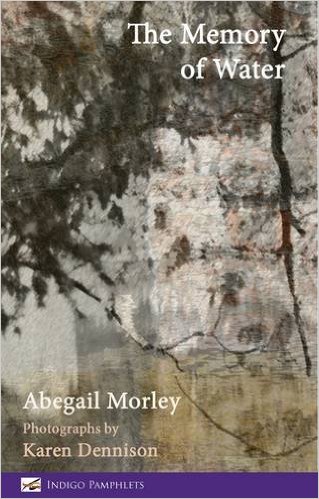“Grief as heavy as red corals”: Terrace by Richard Skinner & The Memory of Water by Abegail Morley
– Reviewed by John Davies –
Richard Skinner, Terrace
Abegail Morley, The Memory of Water
Richard Skinner’s Terrace is a series of poems like a row of linked houses or steps, where we spectators stand to watch the match of Life v Death. A terrace is also a natural shelf, a place of rest. This slim pamphlet deserves its place on any library shelf.
Skinner opens with a gnomic epigraph by Sentimental Journey fan and developer of defamiliarisation, the Russian Formalist critic Victor Shklovsky: “grief as heavy as red corals”. Shklovsky wrote in ‘Art As Technique’:
The technique of art is to make objects ‘unfamiliar’, to make forms difficult, to increase the difficulty and length of perception because the process of perception is an aesthetic end in itself and must be prolonged.
He has a disciple here. Richard Skinner’s collection of twenty-two poems tantalises with hints and glimpses, sleights-of-hand, panache. The first poem is titled ‘The Structure of Magic’, and there’s a feeling of smoke and mirrors about the whole collection, a maestro exploiting the panoply of poetic prestidigitation at his disposal.
As ever, these poems benefit from reading aloud as well as in the mind. Seven titles feature other languages, as do many of the poems. Birds flit through the pages alongside images of maps and geography, flowers and colour. Death is always nearby: elegy is the default mode of English poetry, and its mist suffuses this collection, in a defamiliarised state. Grief made strange, magical.
‘The Structure of Magic’ is a robust alternative Desiderata, full of imperatives, advice to the reader:
Clear your throat and assume the pose
An exhortation to prepare for elegy, deliver the eulogy.
remember, the map is not the territory
(these geographic allusions kick in straight away)
Always leave yourself an exit plan
(Ironic in this age of dementia)
…if you steal, steal well.
Strands of Shakespeare weave like fronds of seaweed through the poems’ depths. Skinner has a strong sense of theatre: the throat-clearing of ‘clear your throat and assume the pose’, advice on delivery. The four-beat rhythm of the opening quatrain eases out over the poem into longer lines:
It is not enough to manage love; you must express it, too.
And does the rest of the collection follow the first poem’s advice? It certainly does.
Ruskin first coined the term pathetic fallacy to describe projections of human emotion into nature, pointing out that the state of mind that uses it is often “one in which the reason is unhinged by grief”. Various poems in the first half of Skinner’s pamphlet reflect this state, as swallows “stitch together huge tracts of air / Into books entitled You Are Not Here”, a place “feels nothing”, and pantaloons “are amazed”.
However, by the end, a death (‘Death in a French Garden’) is reflected simply in a list of objects, and a grandmother is commemorated by her things:
A brown bakelite telephone
With separate handpiece, Leicester 58803.(My grandmother’s things)
This is a beautifully tended garden of poems, some rhymed (although the rhyme scheme is often senescent, alongside a physical deterioration constantly referenced), some in free verse, some in unrhymed couplets. One sardonic, witty prose poem, ‘The Monarch Foundation’, acts as a fulcrum for the whole set, reflecting the imperatives of the first poem and foreshadowing later acceptance. This is a worthy addition to any library, with a recurrent three or four beat rhythm like a funeral drum.
Online research helps comprehension of Skinner’s work, which features words in other languages, history and legends, diseases, the origins of English words. It’s fun; here is a poet who is deftly deliberate. Not an image, not a word position is accidental: the poet as landscape gardener.
The grief pervading most of these poems climbs into “the domain of rocks” in ‘Pillar: High Level Route’. Grief is earthed and so alleviated, although one of the few bum notes is the simile “as slick as a typesetter’s box”, that, I’m guessing, will be out of reach for many. Offering poems to savour, to chew in the mouth, digest in the brain, Skinner’s collection creates a stratified, archaeological exploration of the moods and memories of its conceit. The final poem, ‘Epithalamium’, while not exactly celebrating, offers some kind of hope:
A place where all the waters meet,
where the birds gather in the shadows, and I will find you there.
H2O also features strongly in Abegail Morley’s pamphlet, The Memory of Water. Where Skinner’s soundscape is chunky with fricatives, plosives, and back weighted vowel sounds that add forward pressure, Morley’s tends to be more front weighted and alveolar, bringing a mellifluous music to her lines, especially through the regularly repeated ‘i’ sound of ‘single’ and ‘slim’:
Listen, the water’s
small voice is a siren’s single note;
pocket-sized hands are too slim
to stem the words.(Small voice)
Throughout the set, these sounds bring both stillness and a feeling of flow, as if sitting by water, hearing its dapple.
I twine daisies, set them off
to skate on the surface like floating
votive candles(Remains of the Revenue Officer)
Morley’s conceit here is that water has a memory, particularly the moat at Scotney Castle which inspired many of the poems. Like the homeopath’s belief in water’s ability to remember even one molecule of another substance once added to it, Morley invites us on a fantasy cruise into the moat’s history and other watery reminiscence. The pathetic fallacy is foregrounded:
Nothing escapes water.
…the moat
doesn’t know you’re there, its lapping ripples clear
their throats…Water cannot lose its beginnings,
(The memory of water)
In ‘Jigsaw’, Morley can feel the castle’s damp pulse beat, and in ‘Skin Deep’
…the water sits back on its haunches
Water remembers its first body
(Escape)
and
Water turns in its drunken sleep
The grief that occasions Morley’s use of the fallacy is ambiguous, but its spray suffuses the poems. There’s grief for childhood change, the wake of an ocean:
Now, after I’ve hauled my childhood across the Atlantic
(Jigsaw)
A reverberating cry for help from a grievous relationship:
I mouth the word drowned
rinse the blades under the tap –
he dissolves(Mayday)
and the grief of unfulfilment:
I hug the gaps
in the wind(Downpour)
Of twenty two poems here, six concern the moat, and seven concern the castle’s history: a priest in a priest hole and a murderous smuggler. The moat thus encircles the pamphlet, gives it a strong thematic shape and anchorage.
Again, the poems are in a range of forms, from sonnets to shapely quatrains, tercets and couplets, although none rhymed. If rhymes occur, they tend to echo across a line or bridge several lines:
Geese glide into the space between air and knees.
(Skin Deep)
The moat has already weighed
it up, invited him to walk on its cloak(The water’s mechanics)
At times the line breaks seemed to have been chosen to equalise line length; reading aloud, rhythm and breathing suggest alternative possible settings.
For a long time afterwards water carries the burden
of its trauma, remembers how shifting ripplesonce reached the moat’s edge as it made way
for the body heaved into its depths. Stunned fishshot under logs,
(What the moat knows)
But elegance of presentation is desirable, and these poems are full of grace.
What a shame both publishers fail to provide a printed vehicle to match the quality of the poetry. I was surprised at the poor production values of both pamphlets, especially Abegail Morley’s from Indigo Dreams, at £6. Richard Skinner’s is a better size in the hand and, although smaller, is better value at £4.99. I know the financial trials of small press publishing are exacting, but both productions have been pared to the bone. The text is pleasing to the eye in Terrace, but to my mind the cover didn’t do the collection justice. There’s a rather meagre font in Morley’s text, accompanied by Karen Dennison’s atmospheric photographs, although I’m sure both photographer and poet were hoping for greater definition.
To sum up: Richard Skinner’s Terrace is beautifully wrought, providing different viewpoints on the steps of grief. The poems are knowing and knowledgeable, with a deft touch, and aural and rhythmic vigour.
Abigail Morley’s The Memory of Water is a tightly themed pamphlet exploring an extended conceit with an elegant sound scheme, featuring deceptively simple poems of discrimination, delicacy, gravity and grace.




